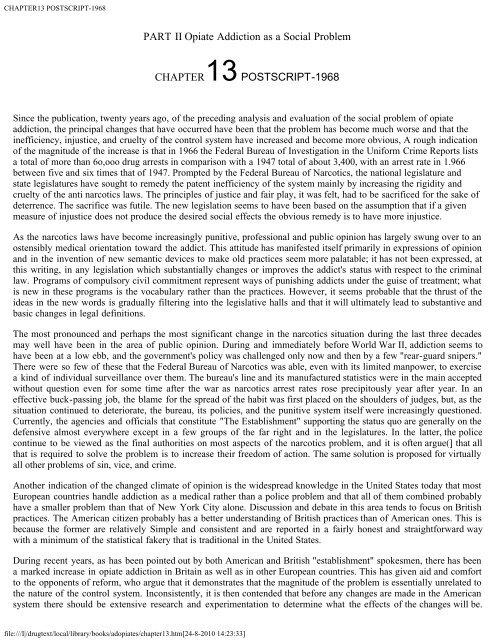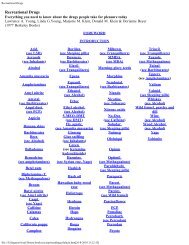Addiction and Opiates
Addiction and Opiates
Addiction and Opiates
Create successful ePaper yourself
Turn your PDF publications into a flip-book with our unique Google optimized e-Paper software.
CHAPTER13 POSTSCRIPT-1968<br />
file:///I|/drugtext/local/library/books/adopiates/chapter13.htm[24-8-2010 14:23:33]<br />
PART II Opiate <strong>Addiction</strong> as a Social Problem<br />
CHAPTER13 POSTSCRIPT-1968<br />
Since the publication, twenty years ago, of the preceding analysis <strong>and</strong> evaluation of the social problem of opiate<br />
addiction, the principal changes that have occurred have been that the problem has become much worse <strong>and</strong> that the<br />
inefficiency, injustice, <strong>and</strong> cruelty of the control system have increased <strong>and</strong> become more obvious, A rough indication<br />
of the magnitude of the increase is that in 1966 the Federal Bureau of Investigation in the Uniform Crime Reports lists<br />
a total of more than 6o,ooo drug arrests in comparison with a 1947 total of about 3,400, with an arrest rate in 1.966<br />
between five <strong>and</strong> six times that of 1947. Prompted by the Federal Bureau of Narcotics, the national legislature <strong>and</strong><br />
state legislatures have sought to remedy the patent inefficiency of the system mainly by increasing the rigidity <strong>and</strong><br />
cruelty of the anti narcotics laws. The principles of justice <strong>and</strong> fair play, it was felt, had to be sacrificed for the sake of<br />
deterrence. The sacrifice was futile. The new legislation seems to have been based on the assumption that if a given<br />
measure of injustice does not produce the desired social effects the obvious remedy is to have more injustice.<br />
As the narcotics laws have become increasingly punitive, professional <strong>and</strong> public opinion has largely swung over to an<br />
ostensibly medical orientation toward the addict. This attitude has manifested itself primarily in expressions of opinion<br />
<strong>and</strong> in the invention of new semantic devices to make old practices seem more palatable; it has not been expressed, at<br />
this writing, in any legislation which substantially changes or improves the addict's status with respect to the criminal<br />
law. Programs of compulsory civil commitment represent ways of punishing addicts under the guise of treatment; what<br />
is new in these programs is the vocabulary rather than the practices. However, it seems probable that the thrust of the<br />
ideas in the new words is gradually filtering into the legislative halls <strong>and</strong> that it will ultimately lead to substantive <strong>and</strong><br />
basic changes in legal definitions.<br />
The most pronounced <strong>and</strong> perhaps the most significant change in the narcotics situation during the last three decades<br />
may well have been in the area of public opinion. During <strong>and</strong> immediately before World War II, addiction seems to<br />
have been at a low ebb, <strong>and</strong> the government's policy was challenged only now <strong>and</strong> then by a few "rear-guard snipers."<br />
There were so few of these that the Federal Bureau of Narcotics was able, even with its limited manpower, to exercise<br />
a kind of individual surveillance over them. The bureau's line <strong>and</strong> its manufactured statistics were in the main accepted<br />
without question even for some time after the war as narcotics arrest rates rose precipitously year after year. In an<br />
effective buck-passing job, the blame for the spread of the habit was first placed on the shoulders of judges, but, as the<br />
situation continued to deteriorate, the bureau, its policies, <strong>and</strong> the punitive system itself were increasingly questioned.<br />
Currently, the agencies <strong>and</strong> officials that constitute "The Establishment" supporting the status quo are generally on the<br />
defensive almost everywhere except in a few groups of the far right <strong>and</strong> in the legislatures. In the latter, the police<br />
continue to be viewed as the final authorities on most aspects of the narcotics problem, <strong>and</strong> it is often argue(] that all<br />
that is required to solve the problem is to increase their freedom of action. The same solution is proposed for virtually<br />
all other problems of sin, vice, <strong>and</strong> crime.<br />
Another indication of the changed climate of opinion is the widespread knowledge in the United States today that most<br />
European countries h<strong>and</strong>le addiction as a medical rather than a police problem <strong>and</strong> that all of them combined probably<br />
have a smaller problem than that of New York City alone. Discussion <strong>and</strong> debate in this area tends to focus on British<br />
practices. The American citizen probably has a better underst<strong>and</strong>ing of British practices than of American ones. This is<br />
because the former are relatively Simple <strong>and</strong> consistent <strong>and</strong> are reported in a fairly honest <strong>and</strong> straightforward way<br />
with a minimum of the statistical fakery that is traditional in the United States.<br />
During recent years, as has been pointed out by both American <strong>and</strong> British "establishment" spokesmen, there has been<br />
a marked increase in opiate addiction in Britain as well as in other European countries. This has given aid <strong>and</strong> comfort<br />
to the opponents of reform, who argue that it demonstrates that the magnitude of the problem is essentially unrelated to<br />
the nature of the control system. Inconsistently, it is then contended that before any changes are made in the American<br />
system there should be extensive research <strong>and</strong> experimentation to determine what the effects of the changes will be.





